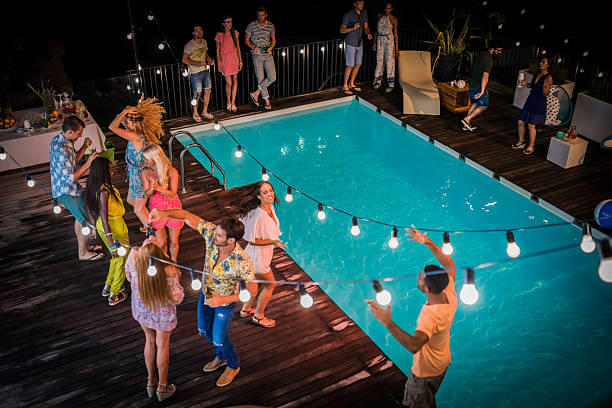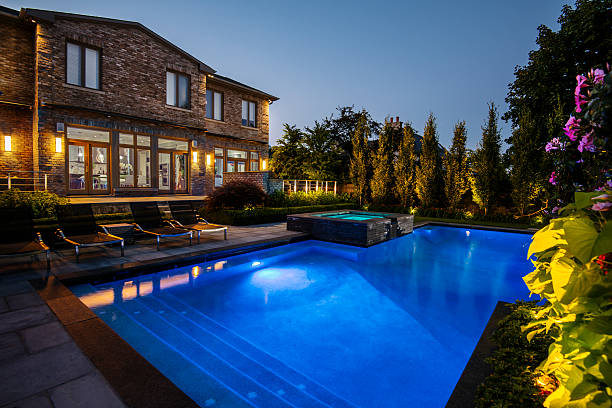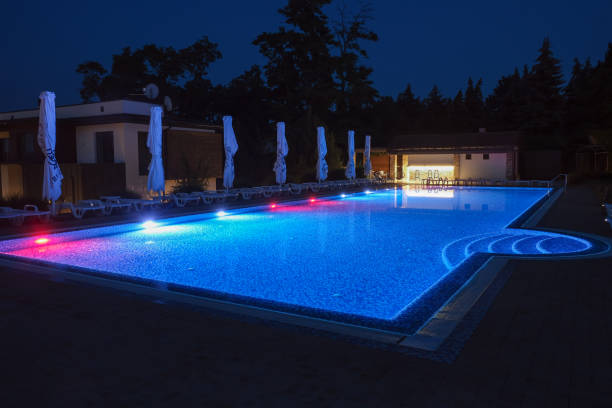
Common Pool Lighting Problems and Solutions
Pool lighting systems are an important component of beautifying your pool space, both in the daytime and nighttime. However, just like every other aspect of your pool setup, the lighting system is not a venue without problems that negatively impact the pool’s safety and aesthetics. Knowing how to identify and fix those common problems in pool lighting can save you money and ensure your pool remains lit up throughout many relaxing evenings or party times.
We will identify some of the common pool lighting problems and offer practical solutions for each. If you are unsure whether it is worth your while trying to fix them on your own, then probably calling a Ground Lighting System expert or a trustworthy Pool Lighting System company will be your best bet.

1. Flickering Pool Lights
One of the most common problems with pool lights is flickering. Though it is annoying, flickering might be more than that-potentially a much bigger problem is lurking.
Causes why your pool light is flickering
Loosened connections: As the process of aging shows an effect on your pool lighting system, most of the electrical connections can loosen; this produces an electric supply that is often at times intermittent to the light.
Water penetration: In some instances, the installation of this pool light may be left open and water can seep into it, which may cause lights to flicker or even completely go off.
Worn-out bulbs: Pool light bulbs like any other light bulb wear out as they age; therefore, they can flicker since they have attained the end stage.
How to Fix Flickering Pool Lights
Check your electrical connections: Ensure that all your wiring and connectors are tightened and fastened well. If you doubt how to handle the electrical systems then get professional assistance on this matter from Ground Lighting System experts.
Replace any damaged fixtures: Water penetration of the light fixture might be best served by replacing the fixture with a new one that’s designed to be watertight.
Change the bulb: Sometimes, just putting in a new bulb will quit the flicker. Make sure you get bulbs compatible with your pool lighting system
2. Pool Light Won’t Turn On
At times, you’ll flip the switch only to find that the pool light doesn’t turn on. Nothing is more infuriating than that.
Causes of Pool Light Not Turning On
Tripped GFCI or Ground Fault Circuit Interrupter: Most pool lights have installed a GFCI outlet. If that gets tripped, it cuts off the power supply to the pool light company.
Fused or circuit breaker: Pool lights operate on electrical circuits and if an overload or short circuit occurs, the fuse may blow or the circuit breaker may trip.
Burned-out bulbs: Again, pool bulbs are not built to last. You might need a new bulb. The light won’t come on, or maybe it’s even darker than it should be, and you just may need to replace the bulb.
Troubleshooting Pool Lights That Won’t Turn On
Reset the GFCI: Locate your GFCI outlet, observe the reset button in it, and push it. It should now have the ability to restore the power to your lighting system.
Check the fuse or circuit breaker: In case it is a blown fuse, replace it. If the breaker tripped then, reset it. But if you think handling electrical panels is too much for you, just contact a Pool Lighting System contractor.
Change the bulb: Test the lighting by substituting the old bulb with a new one. If this solves the issue, then likely the issue was just a bulb.

3. Dull or blinking pool lights
Dimmed pool lighting can also dampen the atmosphere of the pool surroundings. It can also be hazardous as one would not see well what’s there and around the pool.
Why is Pool Lighting Fading?
Less voltage supply: If the voltage supplied to the pool lights is low, then it results in shabby lighting.
Dirty lenses or covers: Precipitates can fall on time and settle on lenses or covers of pool lights causing dimness to the light.
Old or low-wattage bulb: Use of the bulb when it becomes older or of lesser wattage than the recommended causes pool lighting to become less bright.
How to Fix Dim Pool Lighting
Check the voltage. The usage of a multimeter must be carried out in order to determine if the voltage is proper in your lights. If the voltage presented has been dropped, then it should further be diagnosed by a professional.
Clean lenses or covers. Sometimes, you can make your lights appear dim only because of the collection of dirt or algae in your pool light fixture. Remove the cover and clean this item thoroughly.
Replace the lamp: Use a proper wattage of a bulb. Consult or get the specifications issued by the manufacturer or talk to Landscape Lighting Installations and repair people.
4. Water inside the Pool Light
Dripping water into the pool light fixture should be taken care of seriously due to electrical shorts and dangers, etc.
Causes of water leak in pool light fixture
Moisture damage: The rubber gasket of the light fixture will over time become brittle and crack, letting water in.
Loosening: If a light fixture is mounted loosely, then water drips into the device.
Cracking at lens or housing: Even minor impacts against the body of the light as well as the lens cause cracks within the plastic which provide a passage for the water seepage.
Leak in Water Repairs for Pool Light Fixtures
Replace gasket: Look at the gasket of the pool light fixture from time to time for damage. Replace the gasket with a new one if damaged so that the watertight seal can be regained.
Fixing of fitting: Fix the light fixture tightly in place. It should not be loose. If loose, tighten the fittings.
Replace broken parts. If the lens or the housing is broken, it is best to replace the entire fixture so that no further damage from water might be caused.
5. Pool Light Fixtures Corrosion
Corrosion may be significant in the metallic parts of light fixtures exposed to water, more pronounced with saltwater pools.
What causes corrosion in pool light fixtures
Saltwater pools: Salt is corrosive to the metal parts, so if your pool uses salt, then your lights might be more prone to corrosion.
Low-quality materials: Different lighting fixtures use materials not resistant to corrosion and wear out quickly.
How To Repair Rusted Pool Light Fixtures
Employ rust-resistant materials: Choose high-grade pool lighting fixtures of rust-resistant materials such as stainless steel and high-grade plastic.
Apply protective coatings: There are some protective coatings that can be applied to the metal parts of the pool lights before installing them in a saltwater pool.
Seek experts: In case large areas have been consumed by corrosion, you should then look for Ground Lighting System experts or a Pool Lighting System company to replace the pool light fixtures.

6. Pool Lights Overheating
Overheating of the pool lights can be dangerous since it deteriorates and reduces the life span of the used bulb. It may also cause a potential fire risk.
What Makes Pool Lights Overheat?
Wrong application of wattage in bulbs: this is when bulbs that have wattage over or above what is prescribed are used, and therefore, the heating is done to control the lighting which leads to overheating.
Poor ventilation of the light: The light fixture may also not be ventilated enough; such a condition leads to the accumulation of hot air, causing overheating.
Poor circulation of the water: Water around your pool light can cause the lights to overheat.
How to Correct Overheating of Pool Lights
Wattage bulb: The first way is by ensuring that you have bulbs in good wattage that have been specified by the manufacturer to avoid overheating.
Check proper ventilation: Always ensure that a light fixture has proper airflow or water circulation to dissipate the heat. In case of necessity, then see a Pool Lighting System company, which will inspect your installation.
Pool circulation problems: Bad water circulation in your pool can cause your lights to heat up locally. Make sure that your pump and filter system are in good working condition.
7. Pool Lighting Short Circuits
Short circuitry is hazardous and can significantly cause danger. Short circuitry merely means the passage of electricity through an unintended path, which may lead to electrical fires or shocks.
What Triggers Pool Lighting Short Circuits?
Cord damage: If your pool light’s wirings are damaged or worn out, short-circuiting will most likely occur.
Ingress of water: Entry of water into the light causes a short circuit due to a connection that should not exist.
Rusty contacts: The presence of rust on the electric contacts results in an increase in resistance to such a level that the components develop overheating, followed by a short circuit.
How to Fix Pool Lighting Short Circuits
Verify and replace faulty wiring. Faulty wiring should be replaced in a quick turn-around to avoid a short. The expert for the ground lighting system needs to be involved to ensure that the wiring is properly fixed or replaced with no risk of fire.
Do not allow water entry. All fixtures should ensure that they are watertight, and gaskets should not be broken to ensure that no water finds its way in and causes a short.
Replace corroded connectors: a corroded electrical connection should be replaced with a new, clean connector in order to function properly and safely.
8. Unbalanced Pool Lighting
If you have noticed that your pool is bright at one end but dimly or very dimly lit at the other end, then it is probable that your pool lighting system is not balanced.
What causes unequal pool lighting
Low installation of bulbs: The bulbs may not be evenly spaced out then you tend to have unbalanced lighting within your pool.
Different bulbs’ wattage. Using bulbs with varying wattage or light intensity will contribute to unbalanced lighting.
Bulbs nearing their life expectancy: Some bulbs in the Best pool lighting system may be nearing the end of their lifespan causing unstable light levels.
How to Balance Pool Lighting
Replace the bulbs proportionately: All the bulbs should be distributed proportionally in the pool so that there is balanced lighting.
All similar bulbs should be replaced: Replace all the bulbs of the same wattage rating and light intensity.
If dull aged bulbs are present change those aged weak bulbs if one or more of the bulbs are older than the other bulbs.

Conclusion
Your pool’s lighting system requires maintenance to be not only safe but also look good. The three most common problems with pool lighting are flickering lights, water ingress or ingress of water, and uneven lighting. All these can be detected and addressed before to ensure lighting over your pool will be great. Most of the fixes will be able to be done by the owner of the pool. However, major electrical problems or significant repairs should not be attempted by the average homeowner. Such problems should be referred to a Ground Lighting System specialist or Pool Lighting System company. Proper maintenance with prompt repairs will assure you that your pool will be well-lit for years ahead.
For those in need of professional help, veteran Landscape Lighting Installations and repair professionals will give them a permanent solution for peace of mind. Do not sit around waiting for a small issue to turn into a bigger, more costly problem!
